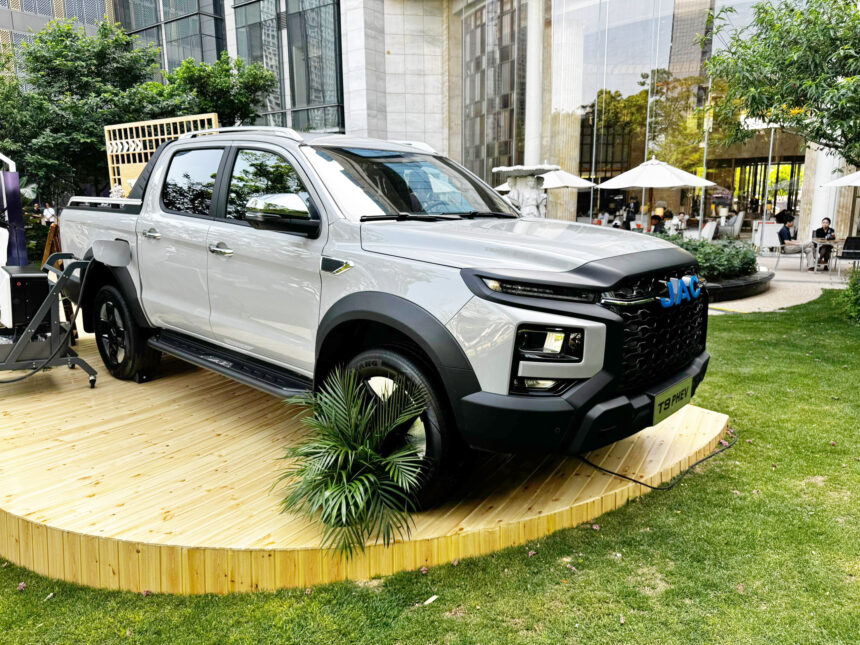Big news for Namibian motorists is the imminent arrival of the much-anticipated JAC T9 PHEV, which opens the floodgates for an alternative energy bakkie to increase performance and reduce fuel consumption.
The plug-in hybrid T9 double cab’s petrol-electric powertrain comprises a 2.0-litre, four-cylinder turbocharged internal combustion engine (ICE) and a duo of electric motors.
This updated configuration is set to produce 385kW and 1000Nm of torque from the combined output of the internal combustion engine (ICE), coupled with the electric motors. On full electric vehicle mode, the bakkie’s range is said to be around 100km. The ICE component of the plug-in hybrid setup churns out 160 kW and 370 N.m of torque. The latter is available from 2 000 r/min.
The dual electric-motor arrangement is coupled with a 31.2 kWh lithium-iron-phosphate battery pack, which supports AC and DC charging.
JAC Motors claims the latter allows for full charge in one hour and 25 minutes, while an AC charge takes about four and a half hours. To enhance its off-road capability, the T9 PHEV features fore and aft electronic diff locks, offering a braked towing capacity of 3 500 kg.
Meanwhile, the increasingly popular JAC Motors Namibia has given all its vehicles a tremendous boost of consumer confidence by increasing the warranty on its domestic offerings from 100 000km to 200 000km over the standard five-year timeframe.
“This decision was taken due to the excellent reliability and performance of the JAC brand in the challenging Namibian and Southern African environment, as well as the increased competition in the specific market segment,” stated JAC Motors Namibia sales manager Karl-Heinz Eisenberg. JAC Motors’ ultimate flatbed workhorse, the X200, offers an amazing deal for a commercial vehicle, namely a seven-year/200 000km warranty,
The 1.3-tonne forward-cab, double-cab boasts a 2.8L TDI’s configuration with an expanded loadbox and payload capacity while being able to accommodate six crew members legally and safely, thereby enhancing productivity and cost-efficiency for any business. Eisenberg noted the X200 double-cab’s ultra-low flat deck is perfect for rapid loading and unloading.
What is more, the X200 double-cab boasts the same load capacity as single-cab counterparts. “It’s a practical and versatile choice, ensuring safe, comfortable and on-time transportation of your crew and
cargo, no matter how challenging the destination,” he said.
The X200’s ultra-flat low deck offers more deck clearance, making loading and unloading goods easier and faster.
The deck clearance is 785mm for both the single and double cabs, which is 30% lower than normal light trucks.
X200s have JAC truck DNA, which is synonymous with a powerful engine and a strong chassis. The X200 curb weight is 20% lighter than a light truck, saving more operational costs for businesses.
In addition, with a new truck steering system, the X200’s turning radius is smaller than 5.5 metres.
The small truck offers front independent suspension and disc brakes, which culminate in an excellent driving performance.
With a growing interest in JAC Motors, the company is making significant moves to enhance its after-sales plans for its dependable workhorse line-up.
This decisive step reinforces the company’s confidence in its products and guarantees peace-of-mind motoring, even in the most challenging conditions.
“Our light commercial workhorses, respected for their efficient performance and reliability, are our cornerstone products with a loyal customer base,” said Karl-Heinz Göbel, CEO of JAC Motors South Africa.
“Now, we provide added peace of mind at no extra cost to new customers joining the JAC Motors family,” he added.
JAC Motors boasts an extensive network of over 70 dealers throughout Southern Africa. Its flagship T9 double cab, with its lifestyle appeal, makes the company to lead a charge in the leisure double-cab market.
This includes the dual-purpose T8 and dependable T6 workhorse.



